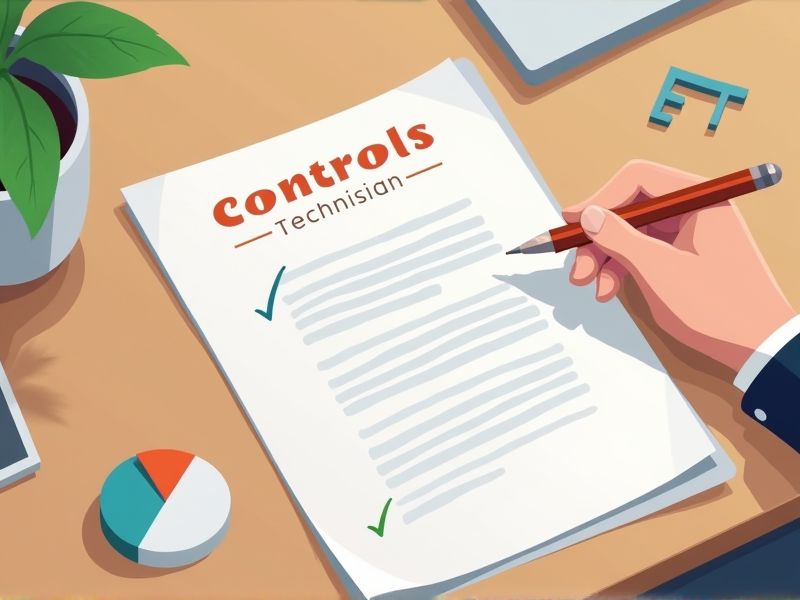
In the field of industrial automation, the role of a Controls Technician involves configuring, maintaining, and troubleshooting control systems. Certifications ensure that these professionals possess the necessary expertise to handle complex equipment and safeguard system integrity. Employers often require these certifications to verify skills related to safety standards and compliance with industry regulations. Consider acquiring these important certifications for success as a Controls Technician.
Certified Control Systems Technician (CCST)
The demand for Certified Control Systems Technicians arises from the industry's need for experts who can ensure the efficient and safe operation of automated systems. A CCST provides assurance of a technician's proficiency in calibration, installation, and maintenance of control systems, which reduces the risk of operational downtime. Employers seek CCST-certified individuals to enhance system reliability, which directly impacts production quality and cost-effectiveness. The certification equips technicians with updated knowledge and skills, aligning their capabilities with evolving technological advancements in automation.
Certified Automation Professional (CAP)
Certified Automation Professional (CAP) credential strengthens a Controls Technician's expertise through structured training and assessment, increasing their competency in automation systems. Achieving CAP status signals to employers that the technician possesses a high level of knowledge and skill, enhancing job opportunities and career advancement. As industrial systems become more complex, CAP assures proficiency in implementing and managing advanced technology solutions effectively. Companies seeking to maintain competitive edge value CAP-certified technicians for their ability to optimize automation processes, reducing downtime and operational costs.
PLC Programming Certification (Rockwell/Siemens)
A PLC Programming Certification from companies like Rockwell or Siemens enhances a control technician's proficiency in operating and troubleshooting complex automation systems. Employers often prefer candidates with this certification, as it validates their expertise with industry-standard technology. Mastery in PLC programming directly correlates with reduced downtime in industrial settings, leading to increased productivity. Certification also equips technicians with the latest safety practices, ensuring compliance with regulatory standards.
Instrumentation Technician Certification
Instrumentation Technician Certification validates a controls technician's expertise in managing and troubleshooting complex control systems. This certification signifies adherence to industry standards, ensuring reliability and safety in automated processes. Employers often mandate certification for credibility and to minimize risk in critical operations. Certified technicians typically command higher salaries and more job opportunities due to their verified skillsets.
Industrial Networking Certification
Possessing an Industrial Networking Certification enhances a controls technician's proficiency in managing complex network infrastructures, ensuring seamless communication between industrial devices. This certification provides the technician with updated knowledge of the latest networking protocols and cybersecurity measures, reducing downtime risks and improving plant efficiency. As modern industrial environments become increasingly data-driven, having verified credentials assures employers of the technician's capability to handle technological advancements. The structured training from certification programs fosters problem-solving skills, enabling technicians to troubleshoot and resolve network issues more effectively.
Electrical Safety Certification (NFPA 70E)
Electrical Safety Certification, such as NFPA 70E, significantly reduces the risk of electrical injuries for Controls Technicians by outlining necessary safety protocols. It mandates proper use of personal protective equipment, which minimizes the likelihood of accidents while handling high-voltage systems. Knowledge from this certification enables technicians to identify electrical hazards and implement appropriate safety measures. Employers often require this certification as it demonstrates a technician's commitment to maintaining a safe working environment.
HAZOP/Functional Safety Certification (IEC 61511)
HAZOP/Functional Safety Certification (IEC 61511) ensures a controls technician can identify and mitigate potential hazards in industrial processes, reducing the risk of accidents. This certification enhances a technician's ability to design and manage systems that meet safety standards and regulations, improving overall process reliability. Employers seek certified professionals to maintain compliance with legal requirements, minimizing liability and potential fines. Industry demand for certified technicians often translates into better job prospects and career advancement opportunities.
NICET Certification in Process Control
The NICET Certification in Process Control ensures that a Controls Technician possesses the necessary technical skills and knowledge to effectively manage and maintain control systems. This certification often results in higher job prospects, as many employers prefer or require certified technicians, reflecting trust in their expertise. Obtaining this certification can lead to career advancement opportunities, often translating to increased responsibilities and salary benefits. The certification also enables technicians to stay updated with industry standards and technological advancements, increasing their adaptability in the ever-evolving automation field.
Advanced Process Control Certification
Advanced Process Control (APC) certification enhances a controls technician's ability to optimize industrial processes, leading to improved efficiency and reduced operational costs. With certification, technicians gain specialized skills in modern APC technologies, making them more valuable in industries where precision and process optimization are critical. Certification often leads to better job opportunities and potential salary increases since employers prioritize candidates with proven expertise. In complex manufacturing environments, certified technicians are crucial for implementing strategies that minimize waste and maximize productivity.
Lean Six Sigma Green Belt Certification
Lean Six Sigma Green Belt Certification equips Controls Technicians with problem-solving skills, leading to improved process efficiency. The certification enhances a technician's ability to identify and eliminate waste, boosting operational performance. Training in Lean Six Sigma principles enables technicians to implement data-driven decision-making, positively impacting quality control. Such skills also increase a technician's value within organizations, potentially leading to career advancement opportunities.
Summary
When you obtain certifications as a Controls Technician, your skillset and expertise are recognized and validated, leading to increased job opportunities. Employers often offer higher pay to certified technicians due to their demonstrated proficiency and knowledge in the field. Certification can also enhance your problem-solving capabilities, leading to improved job performance and efficiency. You enable yourself to stay updated with industry standards and technological advancements, fostering career growth.
